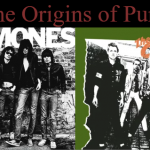Punk rose to prominence in the 1970s, but it continued to evolve in the ’80s, giving rise to several different subgenres and scenes. California and Minnesota were challenging the U.K. and New York with their emerging punk scenes, as the sound of punk and what it meant to be punk was becoming more diverse. Right now, we’re going to chronologically examine the 15 best punk albums of the ’80s. Of course, “best” is a bit of a misnomer because it’s subjective. It was also a next-to-impossible feat to narrow this list down to 15. But each of these albums was historically significant in the evolution of punk, representing important strands in the genre’s DNA. (Editor’s note – This article is a reworking of an article that I previously published on another site, and I am in the process of transferring many articles. Not all of them will be explicitly about protest music, but most will have at least some elements of it.)
Songs the Lord Taught Us – The Cramps (1980)
The debut album of the garage punk band The Cramps was considered important in the development of psychobilly. The tunes on Songs the Lord Taught Us are a lot of campy, tongue-in-cheek fun. The band blends a variety of different forms of ’50s & ’60s rock, including rockabilly, surf, and garage rock. This was all infused with a punk attitude to create something that was fresh and retro at the same time. Listening to this album is still a rollicking good time. Also, as a note, the album was produced by Alex Chilton (formerly of the Box Tops & Big Star).
Los Angeles – X (1980)
X’s debut album stands out because, unlike most punk bands that often reflect their musicians’ limitations, they showcased a higher level of musicianship. Guitarist Billy Zoom, an accomplished rockabilly guitarist, had previously worked as a session musician with artists such as Gene Vincent and Etta James. Additionally, the lyrics penned by bassist and co-lead vocalist John Doe, along with co-lead vocalist Exene Cervenka, exhibit a level of poetry that is uncommon in punk rock. This album was crucial in shaping the Los Angeles punk scene, as highlighted in the documentary “Decline of Western Civilization.” The album produced by Ray Manzarek of The Doors appropriately included a cover of The Doors’ song “Soul Kitchen.”
Fresh Fruit for Rotting Vegetables – Dead Kennedys (1980)
The debut album by the hardcore punk pioneers Dead Kennedys, the songs features Jello Biafra’s highly politicized lyrics combined with a biting satirical humor. The aggressive, all-out musical attack suits Biafra’s spastic vocal warble. This is truly one of the defining albums in the development of the hardcore punk scene.
Damaged – Black Flag (1981)
The band’s debut full-length has become an important part of the evolution of hardcore punk. Damaged was the band’s first recording featuring Henry Rollins as lead vocalist (they previously released three EPs with three different lead vocalists). Rollins was the missing piece of the puzzle. His vocal ferocity was the perfect counterpoint to the band’s aggressive musical attack. The album possessed the right blend of fist-pumping indignation and satirical humor.
Youth of America – Wipers (1981)
The Portland punk band also developed a sound that could be described as proto-grunge. They were also a significant inspiration for Kurt Cobain, who included them on his top 50 list. While their early discography is definitely worth exploring, their sophomore album, Youth Of America, stands out as their most cohesive and intriguing work.
The opening track, with its quiet/loud dynamics, “Taking Too Long,” in particular, provides the grunge blueprints that Nirvana and others implemented to great success. The album also culminates with the perfect bookend in the title track, a ten-minute minimalist punk masterpiece that sees guitars ebbing and flowing over a relentless, heart-pounding rhythm. While such a lengthy composition might not have been accepted in ‘70s punk circles, Wipers demonstrate the foolishness of strict genre boundaries.
Penis Envy – Crass (1981)
The third album by the UK anarcho-punkers ventured into darker territories, addressing themes around gender and sexuality with a fearless lens. Songs like “Bata Motel” tackle misogyny and the pressure for women to conform to oppressive and sexist societal expectations. Vocalist Steve Ignorant took a break on this album, passing the exclusive reins to female vocalists Eve Libertine and Joy De Vivre. This allowed the band to become trailblazers in providing space for feminist themes within punk.
Milo Goes to College – Descendents (1982)
The full-length debut for the Descendents, Milo Goes to College, was a unique album in the development of hardcore punk because the songs were melodic and added a sense of pop sensibility, which was lacking with most hardcore bands of that time period. As described by lead singer Milo Auckerman, the band developed a sound that could be labeled as “melodic hardcore.” The album was also important in the development of pop & skate punk, influencing bands such as Blink-182, Green Day, NOFX, The Offspring, and countless others.
The album title refers to lead singer Milo Ackerman who left the band to pursue his PhD in biochemistry.
Bad Brains – Bad Brains (1982)
The Bad Brains’ self-titled debut was originally released only on cassette. It has since been released on CD and vinyl and is available digitally. The Bad Brains stood out from their hardcore punk peers for many reasons. For example, there was the fact that they were African American devout Rastafarians. They also started as a jazz fusion band. They were also proficient at reggae and included a couple of full-on reggae songs on their debut. Despite the high level of musicianship (or maybe because of it), their brand of hardcore was faster and harder than most of their peers. The ferocity of the music was also matched with the equal vocal ferocity of lead vocalist H.R.
The album ended up being influential in the development of other reggae-influenced fusion rock groups such as Fishbone, Sublime & 311. Adam Yauch of Beastie Boys has been quoted as saying that the Bad Brains’ debut album is “the best punk/hardcore album of all time.”
Walk Among Us – Misfits (1982)
Glenn Danzig’s distinctive but sinister Elvis-inspired vocal style shines on the debut album by the horror punk pioneers, bringing a much-needed sense of levity to the hardcore scene. Instead of sticking to the typical political fodder, the band embraced B-movie culture. Many of the songs, like the anthemic “Skulls” and “Braineaters,” are equal parts fun and terrifying.
Double Nickels on the Dime – Minutemen (1984)
Double Nickel on the Dime was the third full-length album released by the Minutemen. The album was an ambitious and eclectic double album, which was a departure from the band’s hardcore roots. Musically, the album featured elements of funk, country, and jazz, among others. Even though it could be argued whether the album meets the definition of punk in a musical sense, there is no denying that the album is punk in attitude. The anything-goes attitude and the refusal to be confined by established rules are the essence of punk.
D. Boon, who was the band’s lead guitarist and lead vocalist (and who shared songwriting duties with bassist Mike Watt), died December 22, 1985, in a tragic van accident, at the age of 27.
Zen Arcade – Hüsker Dü (1984)
Zen Arcade was an ambitious double concept album for Hüsker Dü. The concept of the album revolved around a young man seeking escape from his terrible home life. He tries to seek escape through the military, religion, and through other means as well. In the end, he comes to the realization that everything that took place happened in his consciousness while he was sleeping.
Like most concept albums, it bordered on self-indulgent and convoluted. But for the most part the band succeeds in their ambition by creating an eclectic masterpiece. Just like with the Minutemen, they evolved beyond their hardcore roots. By including elements of jazz, psychedelia, and folk, they showed that they were not going to allow themselves to be restricted by any genre rules. Because of its diversity, ambition, and scope, Zen Arcade was very important in the development of both punk and alternative music.
Meat Puppets II – Meat Puppets (1984)
The Meat Puppets’ sophomore album moved away from the hardcore roots of their debut, blending punk structures with an eerie, country-infused vibe. This is a very important album in the development of cowpunk. The album is also notable because the album tracks “Lake Of Fire,” “Oh Me,” and “Plateau” were covered by Nirvana on MTV Unplugged, with band members Curt and Kris Kurtwood joining them on stage. The Meat Puppets were a significant influence on Kurt Cobain, and it’s evident in these songs how they laid the groundwork for much of Nirvana’s sound.
Tim – The Replacements (1985)
This was a coin toss between The Replacements’ 1984 album, Let It Be, and their 1985 album Tim. I ended up opting for Tim. I was also debating whether to include either album because, by this point in time, The Replacements were starting to distance themselves from their initial hardcore punk roots. Both albums still had clear elements of punk. But the albums also had their share of more melodic and acoustic tunes as well. The style spectrum displayed on Tim, was best summed up by Paul Westerberg: “Sometimes you just love the little acoustic songs, and other times you want to crank the goddamn amp up, and those two parts of me are forever entwined.”
Just like with the Minutemen and their Minnesota compatriots Hüsker Dü, what made The Replacements so important was that they did not allow themselves to be confined by the traditional rules of hardcore. Punk was all about rebellion and no rules. So, in a sense, this album was punk by not being punk.
13 Songs – Fugazi (1989)
Debating whether or not to include this because it is technically a compilation of the band’s first two EPs, 1988’s 7 Songs and 1989’s Margin Walkers. But it is a kickass collection of songs that was important in the development of DIY and straight edge. “Waiting Room” is also an all-time banger that is fun to sing along to, but the rest of the album is excellent as well. Also, speaking of compilations, I was considering including 1989’s Complete Discography by Minor Threat, another important Ian MacKaye band.
Energy—Operation Ivy (1989)
This is the only full-length album released by Operation Ivy. The band and this album were key factors in the development of ska punk (their sound has also been defined as skacore). Energy is an apt title because the songs possess no shortage of energy. Even though the music is catchy and fun, the lyrics provide insightful social commentary.
The band featured Tim Armstrong (who went by the name Lint) and Matt Freeman (who went by the name Matt McCall), who both went on to greater fame as part of Rancid. Energy was also released in 1991 with their 1988 EP Hectic and two songs from the 1987 Maximumrocknroll compilation album, Turn It Around.


